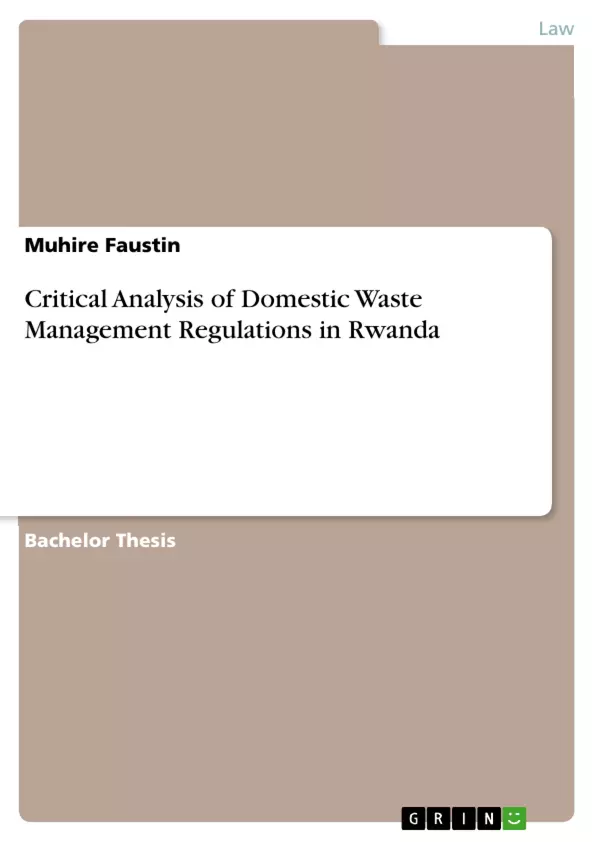This study was brought in by the searcher after he found that loads of domestic waste are seen in various villages, along the roads, forests, riversides, and many other open spaces in Rwanda. People in Rwanda still dispose of domestic waste in inappropriate places, which constitutes a crucial problem to human health in particular and to environment in general.
The researcher wanted to legally explore why the said malpractices still exist, despite the good achievements
and ambitions to deal with waste management in Rwanda. The research had five objectives: to examine whether the existing environmental laws are effective enough to protect environment and human health against negative effects of domestic waste in Rwanda (1), assess if the current Rwandan environmental laws establish standards that are efficient in domestic waste management (2), discuss the processes that are currently followed from collection to disposal
and examine their effectiveness (3), examine the role played by different institutions involved in domestic waste management and its efficiency (4) and to finally suggest areas of improvement basing on lessons drawn from countries that have advanced legislation governing domestic waste management (5). To respond to the objectives of the study, the researcher used different legal research methods and the following was revealed. The existing Rwandan environmental legal framework does not regulate management of domestic wastes effectively, standards established by Rwandan environmental laws are limited in domestic waste management, and the processes used from collection to disposal of domestic waste management are inadequately regulated. It was also revealed that there is limited role/inefficiency of different institutions intervening in domestic waste management.
Inhaltsverzeichnis (Table of Contents)
-
Introduction
- Background of the Study
- Statement of the Problem
- Objectives of the Study
- Research Questions
- Methodology
- Scope and Limitations of the Study
- Organization of the Study
-
Literature Review
- Definition and Concept of Domestic Waste
- Types of Domestic Waste
- Impact of Domestic Waste on Human Health and Environment
- International Best Practices in Domestic Waste Management
- Domestic Waste Management Regulation in Rwanda
-
Analysis of Domestic Waste Management Regulation in Rwanda
- Legal Framework Governing Domestic Waste Management in Rwanda
- The Effectiveness of Existing Environmental Laws in Protecting Human Health and Environment
- Standards Established by Rwandan Environmental Laws
- Processes Followed from Collection to Disposal of Domestic Waste
- Role of Different Institutions Involved in Domestic Waste Management
-
Lessons from International Best Practices
- Domestic Waste Management in South Africa
- Comparative Analysis of Rwandan and South African Legislation
- Recommendations and Conclusion
Zielsetzung und Themenschwerpunkte (Objectives and Key Themes)
This study aims to critically analyze the effectiveness of domestic waste management regulations in Rwanda and identify areas for improvement. The research explores the existing legal framework, examines the current processes followed from collection to disposal, and assesses the roles of different institutions involved in domestic waste management.
- The effectiveness of existing environmental laws in protecting human health and the environment from the negative effects of domestic waste.
- The adequacy of standards established by Rwandan environmental laws for domestic waste management.
- The effectiveness of current processes followed for domestic waste management, from collection to disposal.
- The roles and efficiency of different institutions involved in domestic waste management in Rwanda.
- Lessons learned from international best practices in domestic waste management.
Zusammenfassung der Kapitel (Chapter Summaries)
The introduction chapter provides background information on the problem of domestic waste management in Rwanda, outlining the study's objectives, methodology, and scope. The literature review delves into the definition and types of domestic waste, explores its impact on human health and the environment, and examines international best practices in waste management, including existing regulations in Rwanda. The subsequent chapter analyzes the legal framework governing domestic waste management in Rwanda, evaluating the effectiveness of existing laws, the adequacy of established standards, and the processes followed for waste collection and disposal. It also examines the roles and efficiency of different institutions involved in waste management.
The final chapter examines lessons learned from international best practices, particularly the domestic waste management system in South Africa, comparing it to the Rwandan system and highlighting areas where improvements can be made. The conclusion summarizes the findings of the study and provides recommendations for enhancing domestic waste management regulation in Rwanda.
Schlüsselwörter (Keywords)
This research centers around the critical analysis of domestic waste management regulations in Rwanda. Key themes include environmental law, domestic waste management, human health, environmental protection, legal framework, institutional roles, international best practices, and legislative reform. The study aims to provide insights into the current state of domestic waste management in Rwanda and offer recommendations for improving its effectiveness, with particular emphasis on lessons learned from countries like South Africa with advanced legislation in this area.
Frequently Asked Questions
What is the main problem with waste management in Rwanda?
Large amounts of domestic waste are disposed of inappropriately in villages, forests, and rivers, posing risks to human health and the environment.
Are Rwanda's environmental laws effective for domestic waste?
The study reveals that the existing legal framework does not regulate the management of domestic waste effectively and lacks sufficient standards.
What institutions are involved in waste management in Rwanda?
Various institutions intervene, but the research highlights their limited role and inefficiency in managing the collection and disposal process.
What lessons can Rwanda learn from South Africa?
South Africa has advanced legislation that could serve as a model for Rwanda to improve its own waste management regulations and institutional roles.
What are the recommendations of the study?
The study suggests legislative reform, establishing clearer standards, and improving the efficiency of institutions involved in the waste disposal chain.
- Citation du texte
- Muhire Faustin (Auteur), 2022, Critical Analysis of Domestic Waste Management Regulations in Rwanda, Munich, GRIN Verlag, https://www.grin.com/document/1252955



